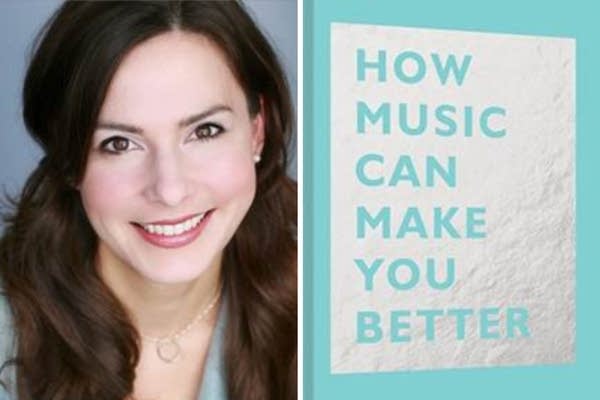A Beautiful World: How music can make you better

Go Deeper.
Create an account or log in to save stories.
Like this?
Thanks for liking this story! We have added it to a list of your favorite stories.
Indre Viskontas is an opera singer and a neuroscientist. She's professor of sciences and humanities at the San Francisco Conservatory of Music, assistant professor of psychology at the University of San Francisco, and the creative director of Pasadena Opera. (Some people just get more done with their days.) Her new book is titled: "How Music Can Make You Better."
She describes the book as a field guide for how music works and how it affects our brains and bodies — and how it can affect society.
Many people think sound and music exist independently of us, but that's not so. Sound occurs only when apprehended by an ear. Therein lies the answer to the strange question: If a tree falls in the forest and there's no one there to hear it, does it make a sound?
Viskontas says no. "Because the sound is not in the sound waves. It's in how the brain turns that information, these factions and compressions of air, into something that we can interpret as a perception, which is how we hear."
Turn Up Your Support
MPR News helps you turn down the noise and build shared understanding. Turn up your support for this public resource and keep trusted journalism accessible to all.
This is why people's taste in music can vary greatly. It's also why figuring out what music you love best is critical to tapping into the healing power of sound. When music is meaningful to you, there are many ways in which it can be used to change the body physiologically.
"We can see that people who are about to go in for surgery, for example, if they listened to music that they like, we actually can track the way their body's physiology shows that they are relaxing," she said. "Their heart rate decreases, they have less anxiety, but it has to be music that calms that particular person. So a lot of people find instrumental or classical music calming, but not everyone."
Music involves complex systems all over the brain, and can repair damaged areas. People who have damaged the left frontal part of their brain lose the ability to speak.
Melodic intonation therapy is a specific type of therapy that combines spoken word with melody. It allows people to bridge speaking with singing.
Let's say a person wants to ask where the bathroom is but just can't get the words out, which happens when the left hemisphere of the brain is damaged. Oftentimes the patient can learn to sing the words before regaining the ability to say them. A great example is former U.S. Rep. Gabby Giffords' relearning how to speak using music. When she couldn't say the word "light," her speech therapist started to sing "This Little Light of Mine," and Giffords was able to sing along with her.
It's well-recorded that Alzheimer's patients often retain the ability to appreciate, understand and even connect through music. That's because our relationship with music involves many different parts of the brain. It's likely that some regions and networks are intact, and can bypass the parts of the brain that are degenerating. And that can help us synchronize some of the activity in our brains and help us feel more connected.
"And to me, that's really the power of music in patients with Alzheimer's disease," Viskontas said. "It's this feeling that you can connect with them. You can get access to their humanity through music."
Viskontas says we can all access our humanity through music.
"Music is really strong social glue," she said. "We see levels of oxytocin, which is the attachment hormone, increase when people are making music together. I think a lot of people are missing out on the power of music by not trying to make it themselves. And part of that is because we have now this culture of ... having to be perfect, having to be really great, not wanting to embarrass yourself by making a silly sound. I hope that with a lot of these music-making tools now that are available, I hope that that will encourage more people to participate in music making and not just be passive listeners."
Viskontas encourages us to use music to design a better life. Music can catalyze emotions we're interested in cultivating. It can sharpen our minds, bestow energy and relieve stress. Music can heal us.
"For me, a beautiful world would be one in which everybody feels that they are meaningful participants in society, that they add something that is important, and that they can feel connected to others and the rest of the world," she said.



